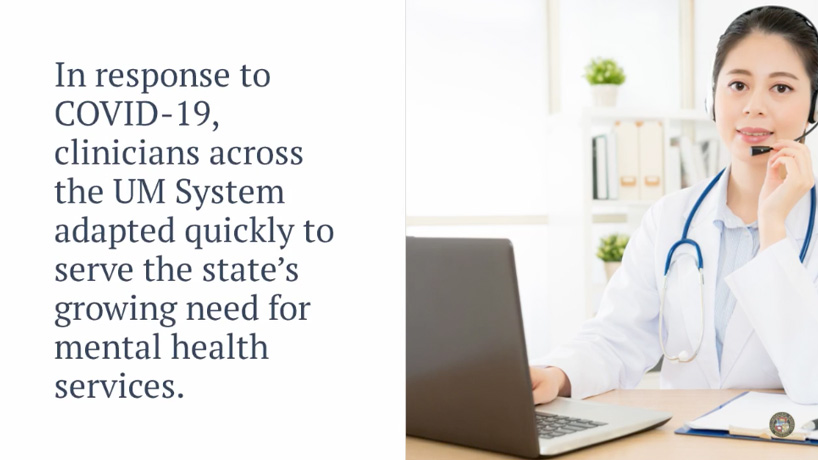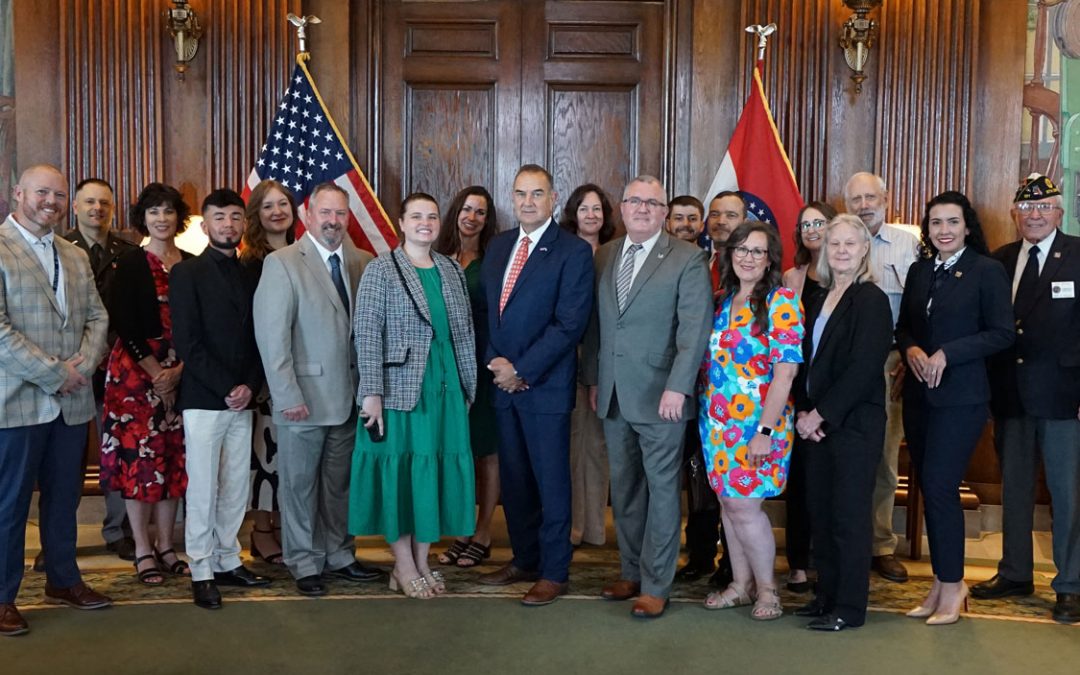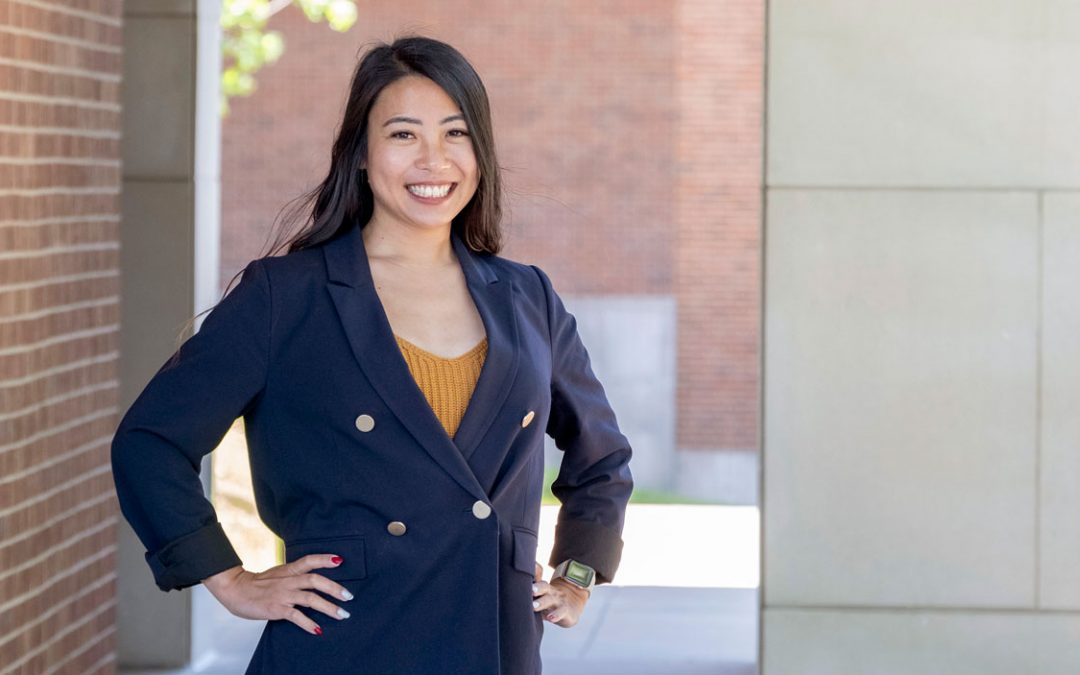Story courtesy of UM System
Some mental health professionals predict that the impact of the COVID-19 pandemic will reverberate for years to come — a concern that has prompted clinicians across the University of Missouri System to adapt quickly to serve already vulnerable clients and prepare for the growing need for mental health services across the state.
Faculty and staff members at the University of Missouri–St. Louis have been doing their part.
“This pandemic has exacerbated all the mental health concerns that our current clients already experience. It has also brought on stressors and emotional suffering to people who hadn’t had concerns before,” said John Nanney, director of the Community Psychological Service in St. Louis and an assistant professor in UMSL’s Department of Psychological Sciences.
CPS, a nonprofit outpatient mental health center established UMSL, provides therapy and psychological assessments to about 400 clients a year. Most are community residents without access to insurance that covers mental health needs. CPS is one of six St. Louis-based mental health treatment services coordinated through UMSL, some also offering statewide services. The University of Missouri–Columbia and University of Missouri–Kansas City offer community-based programs, as well. Additionally, MU Extension helps coordinate statewide mental health awareness and assistance through programs such as “Together We Can,” which targets rural communities and farmers.
Nanney, home on paternity leave in February, listened to the first reports detailing the likely community spread of COVID-19.
“I remember thinking, ‘Uh oh, this is going to get bad. We need to have a plan in place to move online,’” he said. “At the time, I thought that might be a bit dramatic.”
Two weeks later, CPS was ready to transition seamlessly to online and telephone therapy.
“Most people didn’t miss a single session,” Nanney said.
Programs like CPS and the Counseling and Social Advocacy Center, also affiliated with UMSL, help fill a big gap in Missouri’s mental health services system. As part of their internships, graduate and doctoral students — under the supervision of licensed therapists — offer services at no or reduced cost to clients who otherwise would have no access to help.
At the MU Psychological Services Clinic in Columbia, clinicians began offering up to five free telehealth sessions to help deal with COVID-related stress, specifically. PSC Director Debora Bell shared that the top challenges clinicians are seeing include employment stress, family stress, sadness, and lack of motivation.
“Front-line workers are worried about health issues, people whose jobs or hours have been cut are worried about finances, and new graduates worried about the job market,” Bell said. “Children and teens are sad about not seeing their friends and missing prom or graduation. This is especially hard for youth who are socially engaged but may not understand or accept the necessity of distancing. A lot of people are having trouble feeling motivated for school or other tasks. Family stress includes both missing family, but also being stressed by the increased ‘togetherness’ of immediate family, as well as extended family who may now live together to help manage expenses and balance childcare and schooling that are now all on family.”
In the past, training, logistical and technological challenges were impediments to offering telehealth options for mental health services. Ensuring confidentiality and privacy, building rapport and implementing effective interventions were all concerns, noted Emily Oliveira, director of the Counseling and Social Advocacy Center.
“When faced with a crisis situation, you don’t have a choice,” Oliveira said. “Necessity pushes you through those barriers to telehealth. You find a way to do it. Moving forward, this will continue to be part of the services we provide. No longer an optional skill, telehealth training will be incorporated into the basic curriculum. It will provide a more convenient option for some clients than in-person sessions.”
Nanney agreed.
“Doing therapy online works really well,” he said. “I’ve been really heartened that we’ve been able to do the same kinds of interventions as we do in person and that they are as effective.”
Sessions are having a positive ripple effect in some instances, with clients passing on what they are learning to family and friends, including the coping mechanisms they are finding useful. More than 100 youth mental health providers who participated in a recent workshop through the PSC’s Center for Evidence-Based Youth Mental Health reported that the training helped them adapt their treatment to clients’ stress during the pandemic, Bell said.
UM System mental health services for community members – COVID-19 related stress
Statewide
MU Extension and partners recently released a Together We Can toolkit to help rural Missourians access mental health resources.
“This presents the resources to help open up conversations about mental health,” says MU Extension Health and Safety Specialist Karen Funkenbusch.
Center for Trauma Recovery is a multi-disciplinary center of UMSL fostering research, graduate and undergraduate education and service in the areas of trauma and victimization through its specialized Trauma Clinic. The center provides assessment and short-term individual psychotherapy to adults 18 and older for traumatic events including: sexual assault, intimate partner violence, accidents, disasters, physical assault or other crimes, robberies, violence based on sexual orientation or race and surviving the homicide of a loved one.
- Cost: Sliding scale ($30-$120/session); no insurance accepted.
- Contact: Call 314-516-6738 or email ctrgrad@umsystem.edu
- Locations served: Statewide, as well as IllinoisVisit https://www.umsl.edu/psychology/ctr/ for more information
Counseling and Social Advocacy Center at UMSL assists individuals, couples and families in need of counseling services with affordable counseling provided by professional counselors and graduate counseling students. CSAC @ UMSL is operated through the Counseling Program in the College of Education. Services cover youth (children and adolescents age 3-18) and adults and include individual counseling, play therapy, couples and family counseling and group counseling.
- Cost: Telehealth counseling is being provided at no cost through the end of May as a service to the community. For other services, the intake appointment or first session is free, with no obligation to continue. Low cost and sliding scale fees keep services accessible after intake. ($5-$30)
- Contact: Call 314-516-4613 or email csac@umsl.edu
- Locations served: Individuals currently residing in Missouri or able to physically be in Missouri at the time of the appointment are eligible
Psychological Services Clinic at MU provides high-quality, affordable evidence-based assessment and treatment to youth, adults, couples, families, and groups. Services are provided by licensed psychologists and social workers and doctoral trainees in clinical psychology. The PSC-affiliated Center for Evidence-Based Youth Mental Health also provides training workshops for mental health professionals. In addition to these routine services, PSC is offering one to five sessions in Skills for Psychological Recovery to help children and adults cope with COVID-related stress and anxiety related to life and routine changes. These sessions are free to clients and are delivered via videoconference or telephone. The youth services and provider training workshops are supported in part by the Boone County Children’s Services Fund.
- Cost:
- Skills for Psychological Recovery sessions: Client co-pays are covered through the generosity of donors.
- Other services: Standard co-pay for clients with insurance coverage who receive services from licensed providers. For clients without insurance and clients seen by doctoral student trainees, fees vary with income-based fee assistance ($15-$200/session).
- Contact: Call 573-882-5805 or visit psychology.missouri.edu/psychological-services-clinic for more information or to make an appointment.
- Locations served: Statewide
St. Louis area
Center for Behavioral Health is a not-for-profit outpatient mental health center established by UMSL to provide psychological services to residents of the St. Louis metropolitan area. The center is committed to providing high quality, affordable counseling and evaluation services to adults, couples, children and families.
- Cost: Services are provided at no-cost to clients/families. Psychological evaluation and therapy services are grant-funded.
- Contact: Call 314-516-4357 or email csac@umsl.edu
- Locations served: St. Louis City, St. Louis County, Franklin County, Jefferson County, St. Charles County, Warren County, Lincoln County. Illinois: Bond County, Calhoun County, Clinton County, Jersey County, Macoupin County, Madison County, Monroe County and St. Clair County
- Visit www.umsl.edu/cbh/ for more information
Children’s Advocacy Services of Greater St. Louis is a university-based, multidisciplinary center that provides trauma-focused services to youth, families and the community. Children and adolescents (ages 2 -19) who have experienced a traumatic event (e.g. abuse, neglect, witnessing violence) are the target population and services are provided to parents and caregivers of children to help them support their child with recovery.
- Cost: Currently, there are no fees for services charged to clients
- Contact: 314-516-6798 (during remote work operation, leave a message for a return call)
- Locations served: ASGSL serves children in St. Louis City and County through grant funding
Regional
Community Psychological Services
The Community Psychological Service is a not-for-profit outpatient mental health center established by UMSL. Staff promote excellence in the counseling and psychological evaluation services provided to the community. CPS offers timely and affordable services to individuals who would otherwise be unable to afford professional mental health care — assessment, child and family therapy, adult therapy, therapy for older adults and their families, couples counseling, group therapy, child and family therapy.
- Cost: Flat fee private pay for COVID Group ($50); Sliding scale private pay for individual therapy and DBT Skills
- Contact: Email umslcps@umsl.edu
- Visit https://www.umsl.edu/services/cps/ for more information
Missouri Institute for Mental Health (MIMH)
The mission of the Missouri Institute of Mental Health (MIMH) is to improve and transform mental health outcomes through innovative research and program development, program evaluation, community outreach and professional training. MIMH programs serve individuals impacted by, at risk for, or living with a mental illness, behavioral health condition, traumatic brain injury or HIV/AIDS, as well as all sectors who work with these individuals from policy-makers to funders to direct-service workers. Visit https://www.mimh.edu/ for more details.
Kansas City
Community Counseling and Assessment Services
CCAS is in the Division of Counseling and Educational Psychology in the School of Education at UMKC. CCAS provides low-fee counseling to the community. During this time, the center location is closed; clinicians continue check-ins with current clients by phone, with telehealth training underway. New clients will be accepted at the end of May.
- Cost: A variety of affordable counseling and assessment services
- Locations served: Greater Kansas City community















